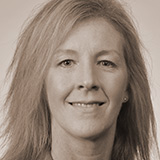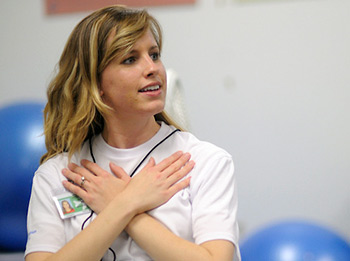


Melinda Valliant
When managers at General Electric Aviation’s facility in Batesville, Mississippi began implementation of HealthAhead, an employee wellness program, they discovered the help they needed was little more than 20 miles down the road at the University of Mississippi. Leaders at the facility enlisted Melinda Valliant, associate professor and director of the Department of Nutrition and Hospitality Management’s coordinated programs, to share what she knew about empowering people to live healthier lives.
HealthAhead is a program run by GE at the site level helping create a healthier work environment at its facilities. Two specific elements of HealthAhead focus on nutrition and physical activity. This is where Valliant’s expertise came into play.
“We can talk to people about being healthy all the time, but we’ve got to show them,” Valliant said.
—Melinda Valliant
The program in Batesville, in its third year, has helped hundreds of Aviation employees develop new nutrition and fitness skills, leading to weight loss, reductions in blood pressure and other health benefits. Graduate students serve as health coaches at the site, motivating and educating employees who choose to participate in the program’s offerings, which include one-on-one nutrition consultations and exercise classes ranging from kickboxing to group cycling. Students also serve as “accountability agents”, forming close relationships with the employees they coach. The relationship is beneficial for the employees, who see health improvements, and for the UM students, who gain valuable professional experience and build competitive résumés.
The student involvement makes the program flexible, innovative and unique, Valliant said.
“Students bring their own flavor to what they are doing,” she said. “They’re energetic, they’re young, and the employees like being around younger people. The students are up-to-date. They keep up with the latest trends.”

Graduate Student Alyssa Ashmore
Valliant added that students are eager to adjust program offerings to meet participants’ needs. “Last year, when the employees said, ‘We want to learn how to go to the grocery stores and shop,’ the students put together grocery store tours. It’s not a canned program. It’s really all driven by what the employees want.”
Valliant has tracked participation and results, paying close attention to higher-risk employees who have metabolic syndrome, a cluster of health risk factors. The results have been inspiring: participation has skyrocketed since the program’s creation, and participants lost more than 450 pounds collectively in 2012.
Valliant and students are also exploring how external motivation may play a part in encouraging employees to participate. Improving fitness and nutrition is challenging because eating and exercise habits are deeply ingrained in daily life, Valliant said. Still, empowered by knowledge, many decide to take on the challenge of improving health.
“Change is hard,” Valliant said. “Asking people to make a change means they have to sacrifice time, because it’s harder to ask them to do something different, and we also may be asking them to sacrifice what they like.”
The changes may extend far beyond the GE Aviation HealthAhead program.
“Sometimes the students get questions from the employees about how to feed their kids,” Valliant said. “I encourage the students to extend the outreach any time they have the opportunity to talk about the family. I want to change the health of Mississippi.”



